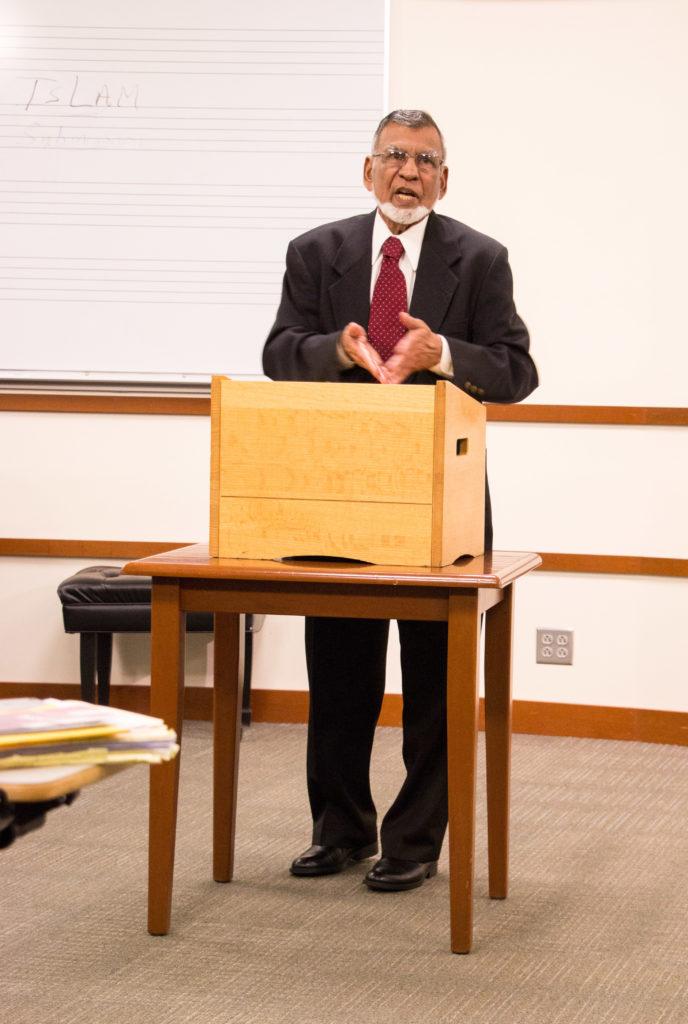
A recent spate of bias-related incidents, including the shooting of two Indian engineers in Kansas and a string of vandalism at Jewish cemeteries, have brought hate crimes back into the forefront of America’s consciousness. Especially for Muslims, who were a rhetorical target for President Trump during his campaign, the threat of discrimination and violence can feel like a part of a daily routine. On Monday, March 6, the Center for Prairie Studies, the CRSSJ and the Religious Studies department invited Mohammed Khan, the Executive Director of the Masjid An-Noor Mosque in Des Moines, to talk to campus about the issues facing Iowan Muslims.
While the Center for Prairie Studies, which usually hosts events related to the environment, may seem like an odd sponsor for the presentation, Professor Jonathan Andelson ‘70, Director of the Center for Prairie Studies, explained that the Center “deals with almost anything going on in the prairie region.” The rise of Trump’s brand of populist nationalism in Iowa warranted sufficient attention for the center to deviate from its usual focus on nature and environmental sustainability.
Professor Caleb Elfenbein, religious studies and history, whose current research focuses on mapping instances of Islamophobia across the nation, introduced Khan and gave some background on the Islamophobia currently present in Iowa.
“In the months following September 11, the incidents of anti-Muslim hate crimes increased by 1,500 percent. In the years between 2001 and today, the presence of hate crimes has leveled off. However, the new normal following September 11th, still is a 400 percent increase above levels pre-September 11,” Elfenbein explained.
When Khan took the stage, he began by explaining the core principles of Islam. He described the origins of the religion, its central tenets and the practices of modern Muslims. He also stressed the relationship between Islam, Judaism and Christianity.
“Islam is one of the Abrahamic religions, and there is a lot of lap over between Judaism and Christianity … and you can see how much there is in common. The Quran, the book of Muslims, mentions the children of Israel,” Khan said.
There seemed to be a little confusion over the content of the talk, though, as Khan once stopped his lecture to ask Andelson if he was speaking on the subject that they wanted him to. Andelson replied that, while anything he wanted to touch on was fine, the talk was supposed to be geared towards addressing current issues faced by Muslims in Iowa. Khan nodded and quickly transitioned into addressing the spectre of Islamophobia. While he said that he could not recall any incidents that had occurred within Des Moines, he acknowledged that discrimination may be more pronounced in the surrounding regions.
“In the suburbs and rural areas, where you don’t have many immigrant students, there you have more problems. The other students will say ‘you go back to your country,’ they will bully them and do some things to them that tell them ‘you don’t belong here.’ So you see this in the rural areas but not in Des Moines proper,” Khan said.
The initial disconnect about the subject matter may have been a product of how Khan, and many Muslims, view their role in American society today. Ever since 9/11, many Muslim-Americans find themselves constantly defending their religion and clarifying many of the misperceptions that American’s have of Islam, according to Elfenbein.
“I can’t emphasize enough how much Muslim-Americans have taken on in terms of outreach … What I’m seeing more and more is that the lion’s share of participation is in outreach efforts, inter-faith dialogue … [which serves to] humanize the work, saying ‘we are human, please don’t be scared of us’ … so I think we need to understand [Khan’s] presentation in light of that,” Elfenbein said.
Perhaps continuing in his role as an ambassador for Islam, Khan stressed the importance of inter-religious dialogue in mending the wounds produced through terrorism and divisive political rhetoric. He is currently a guest speaker at several local churches and synagogues, and his mosque implements an open-door policy, in order for the community to witness the peaceful worship of his congregants and learn more about the religion.
“Because we are close to Drake University and the Des Moines Medical University … we get a lot of students from them, and not just Muslim students,” Khan said. “We have Muslims students come for prayers, but we also have a lot of classes … people can walk in anytime, the door is always open.”






























































